日欧交信型法学研究者養成プログラム
(略称:JEプログラム) 発足記念シンポジウム
「日欧交信型の高度法学教育に向けて」
小野奈穂子 |
|
JE Programme Symposium
“In Pursuit of Advanced Legal Education Based on the Development of Legal Communication
Skills”
By Nahoko Ono |
 |
| 2006年3月9日、EUIJとの共催で、JEプログラムの発足記念シンポジウム「日欧交信型の高度法学教育に向けて」が開かれた。JEプログラムは、文部科学省の「魅力ある大学院教育」イニシアティブとして採択されたプログラムで、法学研究者の国際的な交信能力−国際的な言語で論文を書き、表現し、議論する能力−を育成することを目的とする。2006年度までの2年間のプログラムだが、究極の目標は、日本法の世界への情報発信拠点となることである。 |
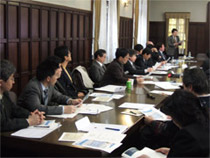 |
| シンポジウムは、外国での日本法教育、日本での外国法教育、それらを日本人/外国人がいかに行うか等、日本法学教育の現状と課題を多面的に捉えて将来への展望を議論する、というものだった。講演者は、ロンドン大学(ユニバーシティ・カレッジ)の小田博教授やドイツ・マールブルグ大学のHeinrich
Menkhaus教授、中国人民大学法学院の韓大元副院長、そして、国内からも学内にとどまらず、慶応義塾大学教授でJean
Monnet Chairの庄司克宏先生など、豪華絢爛だった。また、オーディエンスの多くを占める法学研究科の先生方が4時間以上に及ぶ講演を聞き、熱心に議論を取り交わしたことも印象的であった。そのシンポジウムの内容を紹介したい。なお、本稿は個人的な感想を述べたもので、講演録はHPに掲載の予定である。 |
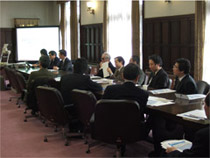 |
 |
|
 |
|
 |
| On March 9, 2006, the Japan-Europe
Legal Communication Training and Development Programme (JE
Programme) held a symposium entitled “In Pursuit of Advanced
Legal Education Based on the Development of Legal Communication
Skills” jointly with the EUIJ. The JE Programme is a government-funded
project, selected from among a number of applications as
part of a series of “Initiatives on Attractive Graduate School
Education” sponsored by the Ministry of Education, Culture,
Sports, Science and Technology (MEXT). The Programme aims
to nurture the legal communication skills necessary for a
legal scholar to excel internationally, namely, advanced
writing, presentation, and discussion skills in foreign languages.
It is a two-year project, but we expect it will lead to the
establishment of a centre disseminating precise and analytical
information about Japanese law in English to the world. |
| The symposium successfully addressed
various aspects of legal education, including the teaching
of Japanese law abroad and foreign law in Japan and how they
should be taught by Japanese and non-Japanese. The eminent
speakers included Professor Hiroshi Oda from University College
London, Professor Heinrich Menkhaus from the Universita¨t Marburg,
Professor Da-Yuan Han from Renmin University in China, and
Professor Katsuhiro Shoji from Keio University. The audience,
most of whom were associated with the Hitotsubashi University
Graduate School of Law, also contributed to the success of
the symposium by actively participating in the discussions.
The following are brief summaries of the symposium. Please
note that the text represents my personal views and the actual
transcripts will soon be uploaded to our website. |
|
パネル1
「ヨーロッパにおける日本法教育の現状と課題」 |
|
Panel 1
Issues Relating to the Teaching of Japanese Law in Europe |
| 小田博教授は、日本法教育・情報の需要と供給にギャップがあるのではないか、という視点から示唆に富む様々な問題を呈示した。供給面では、基本情報からして誤訳等根本的に未熟な現状、一国の法概念を外国語で表現する限界、日本法のアメリカ化に対するアンチテーゼ等を挙げていた。 |
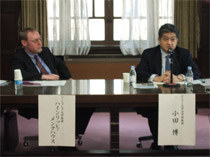 |
とくに、需要面における多面的分析は意義深い。地理的(欧・米・アジア)、人的(研究者・立法担当者・実務家)、質的(文化・ビジネス・モデル論)多様性を考慮すべき、というものである。そして、外国語教育は最重要課題でなく、特定の実定法域の専門知識や比較の視点がより重要であると主張された。
他方、日本法教育をドイツ語で長年行ってきたMenkhaus教授は、ドイツにおいて、日本法の研究拠点が減っている厳しい現状を吐露した。関心が日本法というより、日本・中国を含めたアジアに広がりを見せるなかで日本法教育の需要は減る一方のようで、しかも、その日本法研究家に求められるのは、文化・社会を含めた広い知識であり、法的専門知識の深さでなくなっている現状を危惧していた。 |
|
|
Professor Oda presented various
insightful issues from the perspective that there is a gap
between the demand for and supply of the teaching of, and
dissemination of information relating to, Japanese law. Regarding
the supply side, he pointed out that the basic information
provided contains so much mistranslation that it would necessarily
affect the application of such information; that there is
a limit to our ability to express a concept of Japanese law
accurately in a foreign language; and that there is some
resistance towards the Americanization of Japanese law. As
for the demand side, he emphasized that it must take into
account a variety of factors, namely, geographical (Europe,
the U.S., or Asia), personal (scholars, policymakers, or
practitioners), and qualitative (culture, business, or model
laws). I found it particularly useful to recognize the demand
from policymakers in foreign countries. In conclusion, he
suggested that what is important is not language, but rather
a professional knowledge of substantive law and a comparative
law perspective.
Professor Menkhaus, who has long been teaching Japanese law, noted the severe
reality of the teaching of Japanese law in Germany, where several research institutes
of Japanese law are now facing closure. As people widen their scope of interest
to the whole Asia, including China, the demand for education in Japanese law
continues to decrease. More disappointingly, because these research institutes
of Asian law need only one scholar expert in Japanese law, he/she need not have
a specialist legal knowledge, but rather a broad, general knowledge including
cultural and social aspects. |
 |
|
パネル2
「日本におけるヨーロッパ法教育の現状と課題」 |
|
Panel 2
Issues Relating to the Teaching of EU Law in Japan |
| 国際的な法学研究者になるため、専門的な法学知識と語学力をいかにバランスよく習得するかは微妙な問題である。加えて、専門的な法学知識には、その体系的理解も不可欠であろう。庄司克宏教授は、ご自分のEU法講義内容を紹介しながら、体系的理解の重視を明快に説明した。EUという組織の性質や国内法制度との関係、超国家的法秩序たるEC法と政府間協力の枠組たるEU法(狭義)の区別等、変遷するなかで変わらない本質的部分が何で、そのどれを強調すべきかに焦点をあてていた。ただ、体系的理解が専門的知識の深さを基礎とすることは言うまでもない。 |
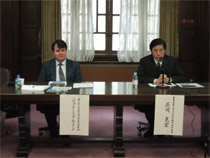 |
| 一橋大学からはJohn Middleton助教授が、担当する英米法講義のレジュメや試験問題を披露しながら、英語による英米法教育の意義と問題点を指摘した。英国、オーストラリア、米国の三ヶ国比較で憲法から契約法まで総括する広範囲な授業内容から、英米法原理を学ばせようとするもので、学生の関心も徐々に高まっているようだが、語学が少なからず障害となっていることも現実のようだ。 |
|
|
As the first panel
revealed, it is difficult to strike the right balance between
the professional legal knowledge and technical language skills
required by a legal scholar in order to excel internationally.
Furthermore, professional legal knowledge requires not only
a deep, specialized knowledge, but also a good understanding
of the overall systems. In this regard, Professor Katsuhiro
Shoji from Keio University stressed that an understanding
of the big picture is the essence of the education he provides.
Using his EU law class outline as an example, he focused
on what the universal principles are over time and what must
be emphasized among them, e.g. the organizational nature
of the EU, the relationship with each national law, and the
three principles of market integration, security cooperation
and defense cooperation. Needless to say, the big picture
cannot be seen without a deep, specialized knowledge.
Associate Professor John Middleton from Hitotsubashi University demonstrated
what he actually teaches in his Anglo-American law classes. That coverage is
broad, providing a comparative analysis between England, Australia, and the U.S.
in many areas from constitutional law to the law of contract. Despite his best
efforts to cater for the lack of advanced English skills on the part of some
of his Japanese students (he teaches in English), he has found that such language
problems do hinder some students from learning principles of foreign laws to
a significant degree. |
 |
|
パネル3
「日本から世界へ−日本の法学教育への期待」 |
|
Panel 3
From Japan to the World - What We Expect from Japanese Legal Education |
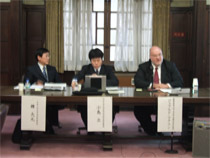 |
慶応義塾大学のGerald McAlinn教授は、日本で長く米国の弁護士実務に携わってきた経験をもつ。日本の弁護士や法学研究者の語学力の問題、ゆえに日本法情報へのaccessibilityの低さを鋭く指摘した。日本法の教育者として日本人が最適であることは自明で、コミュニケーション能力を養成して、いわゆる米国のLL.Mのように日本のロースクールを本拠地として日本法情報を発信すべきだと提言された。
九州大学の小島立助教授は、1994年から始めている、留学生対象の英語で法学教育を行うLL.Mプログラムを紹介した。試行錯誤しながら、帰国して枢な地位を占めている卒業生を招いたシンポジウムを開催したり、同窓生ネットワークの組織化を企画したり、と継続的に発展し続ける様子は、大いに参考になる。とくに、国際交流や博士論文(英語)の査読などを通じて、教員もまた学習し、集積していく、いわゆる互学互修の重要性を感じた。
最後の講演者は中国人民大学の韓大元副院長で、中国における日本法研究の歴史−アジアのなかで西側の法律を先駆けて導入した日本の法制度を研究することがいかに重要であったか−その過程で日本法研究を体系化することがいかに重要かを説明した。ここでも体系的理解の重要性が強調されたと思う。また、法学教育において、欧米に目を向けがちだが、中国との法学研究交流が同様に、あるいはそれ以上に重要であると改めて認識した。 |
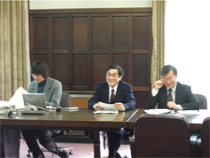 |
|
|
Professor Gerald McAlinn from Keio
University has many years’ experience as a practicing lawyer
in Japan and claimed that there has not been any improvement
over that period in the English skills of Japanese, resulting
in a low level of access to information about Japanese law.
As Japanese have a natural competitive advantage in the teaching
of Japanese law, he suggested that Japanese legal scholars
should acquire international communication skills and Japanese
law schools should be the platform to disseminate such information
about Japanese law to the world.
Associate Professor Ryu Kojima from Kyushu University introduced that institution’s
LL.M. programme for foreign students, where classes are taught in English. Since
its establishment in 1994, the programme has continued to evolve through countless
trials and errors. One of the notable achievements was the conference held last
year, inviting alumni who are now distinguished figures in their home countries.
He also revealed a plan to establish an alumni network, which will naturally
be global. I was particularly impressed by the fact that faculty members sought
to learn and improve themselves through these challenges, e.g. by organizing
international seminars and supervising and assessing doctoral theses in English.
The last speaker was Professor Da-Yuan Han from Renmin University in China.
He presented a history of Chinese research on Japanese law. It has been very
important for Chinese to study Japanese law since Japan is seen as a pioneer
in introducing both the Continental and common law systems from Europe. Once
this process reaches an advanced stage, the most critical task is to integrate
all the studies in a systematic way. Here again, a systematic understanding of
the issues involved is the key. Although we tend to focus our attention on Western
legal systems, his speech made me realize how important it is to develop academic
exchanges with Chinese legal scholars as well. |
|
| |
 |
 |
 |
| さいごに |
Some Final Thoughts |
| たしかに、法学研究者にとって法の専門的理解に比べると、外国語教育は最重要課題ではない。しかし、不要ではないし、現状はあまりに乏しい。山内進教授(元研究科長)が示唆するように、最低限の語学力、国際的交信能力は今とりかかり始めても早くないだろう。JEプログラム発足記念シンポジウムは、国際的交信能力養成への真剣な取り組みを表明して、成功裡に終了したと思う。 |
|
|
| It may be true that language is
not the most critical issue for Japanese legal scholars as
compared to legal expertise. However, that is not to
say that such language skills are unnecessary, and I personally
believe that Japanese English skills will remain poor for
some time. As Professor Susumu Yamauchi (then Dean of the
Hitotsubashi University Graduate School of Law) mentioned
in his closing remarks, now is the time to seriously engage
in a project aimed at improving the language skills of Japanese
legal scholars and nurturing their international communication
skills. Those are precisely the objectives of the JE Programme. |
|
| |
|
|
|